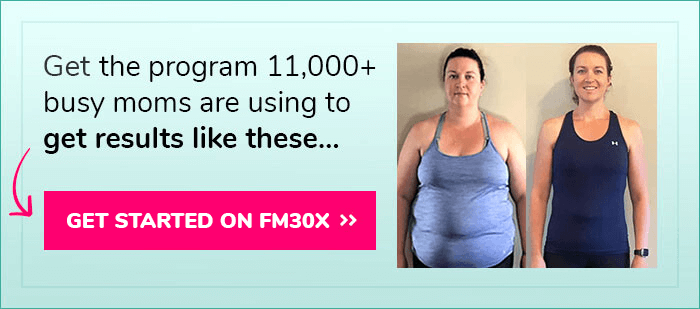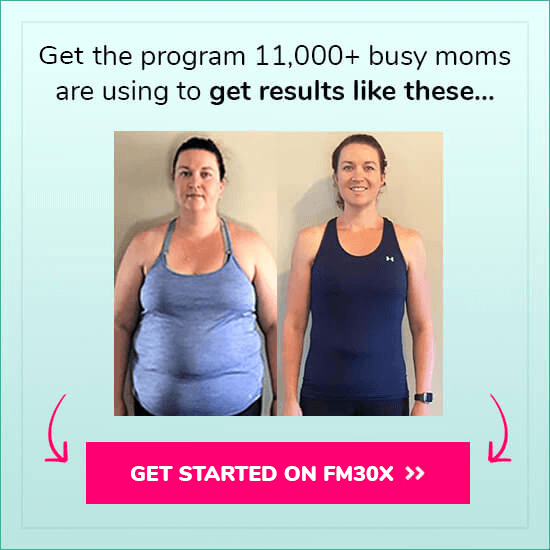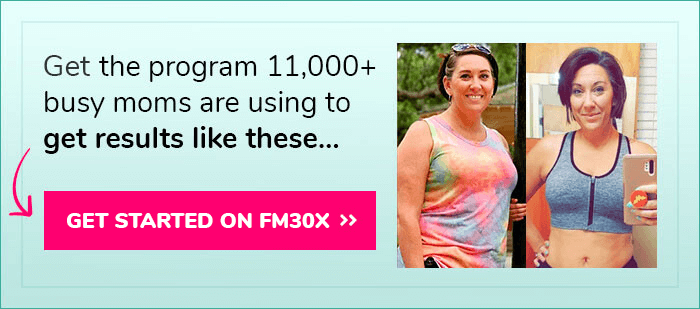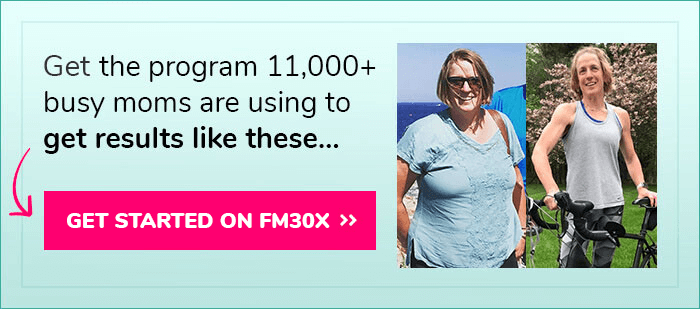Is it good to work out on your period? Is it safe? These are questions that many women ask every month, but answers are often hard to find.
If you struggle with cramping, headaches, bloating, fatigue, or other bothersome symptoms during certain times of the month, you may be thinking about skipping workouts.
There are several reasons women may be tempted to avoid exercise during menstruation.
Examples include suffering from symptoms of premenstrual syndrome (PMS), heavy bleeding, or even mood changes associated with hormone fluctuations.
However, there are numerous benefits associated with exercising before, during, and after your period!
Is it good to work out on your period?
The bottom line is there's no reason to skip exercise when you're on your period, especially after finding ways to minimize or eliminate bothersome PMS symptoms.
In fact, exercise often eases common PMS symptoms like fatigue, cramping, headaches, and more.
But if you have to alter typical workouts or ease up a bit during your period, don't hesitate to do so.
If you struggle with heavy bleeding during menstruation, check in with your doctor to rule out underlying medical complications.
Keep reading to find the answers to all your questions about working out during your period!
Want more exercise tips? Check out this video on workout timing!
Common Reasons Women Skip Workouts During Their Period
Some of the reasons women might skip exercise when they have their periods include bothersome, even debilitating in some cases, symptoms.
Examples include:
- Fatigue
- Bloating
- Headaches
- Nausea
- Cramping
- Irritability
- Heavy bleeding
- Depressed mood
- Joint pain
- Muscle pain
- Constipation or diarrhea
- Breast tenderness
About 3 in 4 women have some form of PMS, including many of the symptoms above.
Some experience mild symptoms, while others struggle with severe symptoms that might make it difficult to get into an exercise mindset.
Due to PMS, you may feel lousy, sluggish, and not ready for workouts.
But while it's perfectly fine to take days off from exercising now and then, avoiding workouts entirely while on your period isn't the best option.
In just 6-weeks on our FOUNDATIONS Program, you'll transform your health and body, for the rest of your life!Join our 6-Week Program...
You'll Gain Health for Life!
Is It Good To Work Out On Your Period?
It's best to exercise most days of the week to achieve and maintain superior health, even when menstruating.
The average number of days women are on their periods each month is two to seven days every 21-35 days.
Your cycle might vary slightly from this average.
Taking a day or two of rest each week to allow your body to recover after a workout is healthy but avoid skipping workouts more than one or two days in a row (unless you have medical reasons for doing so).
Instead, do what you can to diminish crippling symptoms while on your period in order to stay as active and healthy as possible.
Studies show the only significant difference in the ability to exercise while menstruating is during endurance events, such as marathons.
Women who had ovulated but not yet started their periods had slightly more difficulty working out in humid, hot weather.
In most cases, however, you should be able to effectively and safely exercise all throughout the month, even during your period, especially if you take steps to diminish PMS symptoms.
In fact, regular exercise is a good way to lessen such symptoms.
In just 6-weeks on our FOUNDATIONS Program, you'll transform your health and body, for the rest of your life!Join our 6-Week Program...
You'll Gain Health for Life!
Ways to Reduce Symptoms during Menstruation
If painful symptoms during your period prevent you from exercising, ask your doctor about the following solutions that can reduce PMS symptoms (cramping, fatigue, depression, headaches, etc.):
Over-the-Counter Pain Medicines
Taking over-the-counter pain relievers as directed by your doctor can alleviate headaches, joint pain, cramping, and other irritating PMS symptoms.
Being pain-free helps optimize your workouts and makes you less likely to skip exercise.
Prescription Medications
Your doctor may prescribe medications that diminish troublesome symptoms, improve your mood, or reduce aches and pains associated with menstruation.
Ask your provider if you're a candidate for taking medications, and which are best for your personalized needs and situation.
Hormone Treatments
Check with your doctor about taking hormonal contraceptives or other hormone treatments that help stabilize hormone levels, thereby reducing heavy bleeding and other debilitating symptoms you may experience while on your period.
You might take birth control pills, use an intrauterine device (IUD), or receive a birth control implant or subdermal hormone therapy pellets to feel better during your period and all month long.
Treatments for Heavy Bleeding
Heavy bleeding can feel crippling for some women, especially when trying to exercise.
It's important to see your doctor if you encounter heavy bleeding, as it could be a sign of a gynecological condition or an underlying medical problem.
Heavy menstrual bleeding is characterized by:
- Having to wake up at night to change sanitary protection
- Soaking through one or more tampons or sanitary pads every hour for several consecutive hours
- The need for double sanitary protection
- Passing blood clots larger than the size of a quarter
- Restricting certain daily activities due to heavy menstrual bleeding
- Having your period for longer than a week
Heavy bleeding not only makes it difficult to stay active, but it also increases your risk of iron-deficiency anemia and other complications.
Signs of anemia associated with heavy periods include fatigue, shortness of breath, dizziness, lightheadedness, and weakness.
Your provider might recommend you take dietary supplements to correct the anemia and increase your energy.
To reduce heavy bleeding, your provider may suggest hormone treatments, medication changes, lifestyle changes, treating a gynecological condition if you have one, or medical procedures like endometrial ablation.
However, not all medical procedures are options for women who still want to have children.
Healthy Weight Management
Studies show that obesity is associated with heavy menstrual bleeding, which may hinder your ability to make it to the gym or complete long or intense workouts.
Obesity might also increase the risk of joint pain, fatigue, and other symptoms that further diminish your ability to exercise comfortably.
Maintain an ideal weight by eating nutritious foods, exercising regularly, getting at least 7 hours of sleep each night, minimizing stress, drinking a lot of water, and joining an organized healthy living program for women.
Seek treatment if a mental health condition negatively affects your appetite, eating habits, and body weight.
Diet Modification
Believe it or not, altering your diet can reduce symptoms associated with PMS.
Eat small, frequent meals and limit salty foods to lessen fluid retention and bloating.
Limit or avoid alcohol whenever you can.
Pick fiber-rich carbohydrates, including fruits, whole grains, vegetables, nuts, seeds, and legumes, over refined grains like white bread.
Add in calcium-rich foods, such as dairy foods, plant-based dairy alternatives, or dietary supplements containing calcium and vitamin D.
Don't forget to add in chicken, fish, eggs, and other high-protein foods.
Consider protein shakes containing protein powder mixed with water, milk, or plant milk.
Eat healthy fats like avocados, fatty fish, olive oil, avocado oil, other plant oils, nuts, seeds, and nut butter.
To make all of this easier for you, check out our Perfect Plate method!
Regular Exercise
Rather than skipping exercise during your period, alter your routine if needed based on what feels comfortable.
Aim to get at least 30 minutes of exercise most days of the week.
Incorporate cycling, walking, jogging, rowing, or other aerobic exercises in your routine in addition to weightlifting, circuit training, and other strength-training workouts.
You might also try yoga or Pilates while on your period.
If you need to ease up on your intensity level because of bothersome PMS symptoms during menstruation, doing so is better than skipping workouts altogether.
Exercising during your period helps combat fatigue, depression, and other unpleasant symptoms you may struggle with.
In fact, studies also show that exercising regularly during menstruation can lead to fewer painful cramps.
Try Stress Reduction Techniques
To ease stress, which often worsens PMS symptoms, consider utilizing stress-reduction strategies on a regular basis.
Get plenty of sleep; spend time outdoors; try deep breathing, meditation, yoga, or tai chi; or get a massage to keep stress levels low.
Lighten up an overly busy schedule and take vacation days from work as needed to maximize your mental and physical health.
Recovery
Resting your body is important to look and feel your best, but you don't have to skip workouts during your period to do so.
Simply set a regular bedtime, get at least seven hours of sleep each night, and take a day or two off from strenuous exercise each week to allow your body to recover.
On your days off from planned exercise, you can still squeeze in a walk or do activities of daily living to keep your body moving.
In just 6-weeks on our FOUNDATIONS Program, you'll transform your health and body, for the rest of your life!Join our 6-Week Program...
You'll Gain Health for Life!
Which Workouts are Best During Menstruation?
Many women can do the same workouts during their periods as they do when they aren't menstruating, but everybody is different.
You might have to ease up a bit or take over-the-counter pain reducers for cramping or headaches prior to exercising while on your period.
Incorporate cardiovascular and resistance exercises into your weekly routine to stay fit, reduce the risk of chronic diseases, and look and feel great.
If you need to avoid certain workouts during your period, such as high-intensity exercises, marathons, or swimming, don't feel guilty about doing so.
For best results, switch up your usual workout routine regularly, and don't feel bad about taking a day off to rest.
And if you need to find new and different workouts to try, just click here!
Erin Coleman is a registered and licensed dietitian with over 15 years of freelance writing experience. She graduated with her Bachelor of Science degree in nutritional science from the University of Wisconsin-Madison, and completed her dietetic internship at Viterbo University in La Crosse, Wisconsin. Prior to beginning her career in medical content writing, Erin worked as Health Educator for the University of Wisconsin-Madison Department of Internal Medicine. Her published work appears on hundreds of health and fitness websites, and she’s currently working on publishing her first book! Erin is a wife, and a Mom to two beautiful children.
Fit Mother Project is the answer you’ve been looking for. Inside the program, you’ll receive: Our Fit Mother 30X Program (FM30X) is the answer you’ve been looking for. Inside FM30X, you’ll receive: The FOUNDATIONS Program is created by Dr. Anthony Balduzzi for Women 40+ who want Lifelong Health. In just 6-Weeks following FOUNDATIONS, you'll experience: FOUNDATIONS has transformed 60,000 lives! Are you ready to experience true lasting health & results?If you’re a busy mom who wants to finally lose weight,
get healthy, and actually keep the pounds off for good,
this is the simple program you’ll love sticking to…
If you’re a busy mom who wants to finally lose weight,
get healthy, and actually keep the pounds off for good,
this is the simple program you’ll love sticking to…
LEARN MORE ABOUT FM30X »
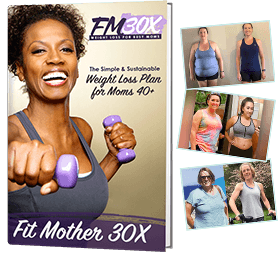
Learn More About FM30X

Join our 6-Week Doctor Designed Health Program.
You'll Gain Foundational Health for the Rest of Life.
*Please know that weight loss results & health changes/improvements vary from individual to individual; you may not achieve similar results. Always consult with your doctor before making health decisions. This is not medical advice – simply very well-researched info on answering the question, is it good to work out on your period?



